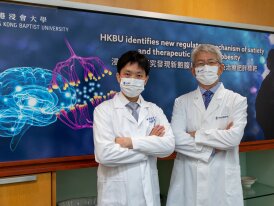
HKBU research investigates local fake news ecosystem through machine learning

A team of transdisciplinary researchers at Hong Kong Baptist University has recently investigated the potential of machine learning techniques for automatic Cantonese COVID-19 fake news detection on social media. The findings have been published in the 2021 IEEE International Conference on Big Data (https://ieeexplore.ieee.org/document/9671722).
With the prevalence of social media, fake news has become one of the greatest challenges in journalism which has weakened public trust in the news outlets and authorities. During the COVID-19 epidemic, pandemic-related fake news were found to misled general readers. Recent works have investigated fake news detection on social platform in English and Mandarin; however Cantonese fake news has been understudied.
In collaboration with the Nanjing University, the research team led by Dr Celine Song from the Department of Journalism and Dr Liang Lan from the Department of Communication Studies presented an annotated COVID-19 related Cantonese fake news dataset collected from a popular local discussion forum in Hong Kong and explored the dataset by applying topic modeling to identify the topics that contain the most significant amount of fake news. The research team evaluated both traditional machine learning algorithms and deep learning algorithms for Cantonese fake news detection. Their results show that machine learning techniques are a promising solution for automatic fake news detection. Their results also suggest that more well-tailored machine learning models are needed for accurate Cantonese fake news detection.
The epidemic of online misinformation in Hong Kong makes it imperative to gather empirical evidence and develop an effective diagnostic framework that guide efforts in the mitigation of fake news.
Dr Celine Song
Department of Journalism
“The epidemic of online misinformation in Hong Kong makes it imperative to gather empirical evidence and develop an effective diagnostic framework that guide efforts in the mitigation of fake news,” says Dr Song. “The long-term project proposes a mixed-methods framework combining computational approaches and in-depth interviews to tackle Chinese fake news in Hong Kong.”
Ms Ziwei Wang, also a member of the research team and a first-year PhD student at the HKBU Institute of Transdisciplinary Studies added, “the findings of the project will make a good source to the HKBU Fact Check, a new and independent platform operated by the School of Communication and Film that follows principles of journalistic professionalism to write free of prejudice, bias, and external influence. “We will continue to explore more possibilities for understanding and detect local fake news, and develop more well-designed mechanism that could be employed for Fact-checking service in the near future.”
Contact Our Researchers
DEPARTMENT OF JOURNALISM
DEPARTMENT OF COMMUNICATION STUDIES
Reference
- Wang, Ziwei, Minzhu Zhao, Yu Chen, Yunya Song, and Liang Lan. 2021. “A Study of Cantonese Covid-19 Fake News Detection on Social Media.” In 2021 IEEE International Conference on Big Data, 6052–54. https://ieeexplore.ieee.org/document/9671722
- HKBU Fact Check https://factcheck.hkbu.edu.hk
- Combating COVID-19 in Hong Kong https://research.hkbu.edu.hk/highlighted-projects/overcoming-vaccine-hesitancy-in-hong-kong




